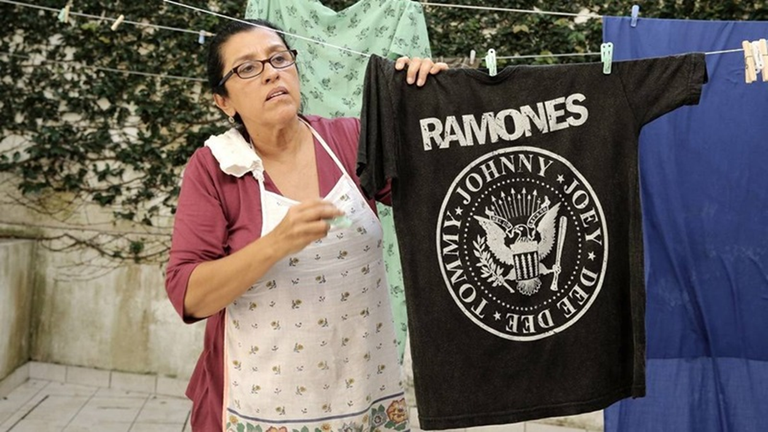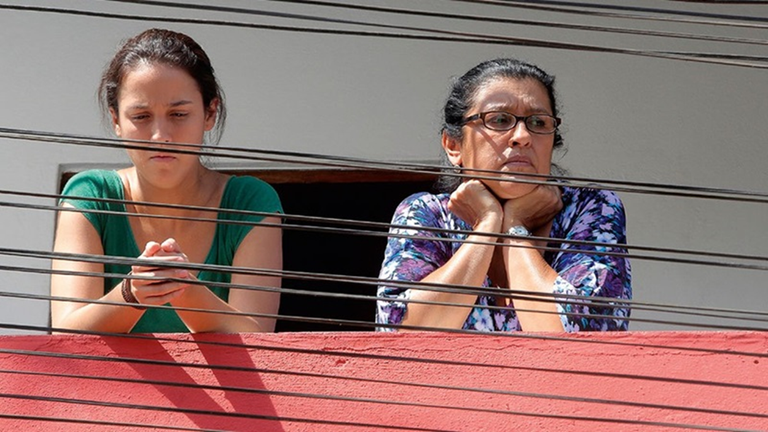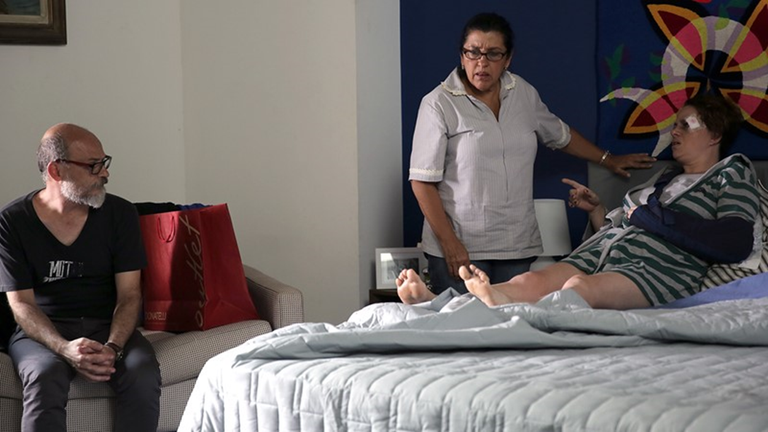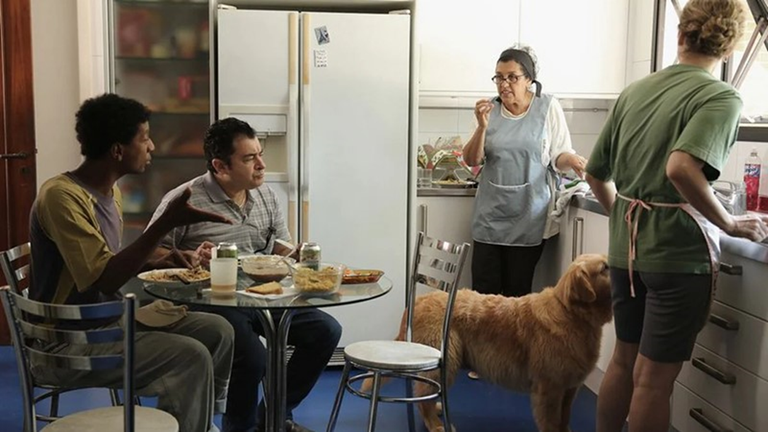CRÍTICA DE FILME: “Que Horas Ela Volta?” (2015)

IMDb
[PT]
Sinopse: Val é uma mulher pernambucana que se muda para a capital paulista para buscar uma vida melhor para ela e para à filha que ela deixou aos cuidados da família em sua cidade natal. Ganhando à vida como empregada doméstica, ela não faz ideia de como à vida ela irá mudar a partir do momento em que Jéssica precisa ir visitá-la.
Não há dúvida de que entre todos os gêneros cinematográficos, o drama é a força motriz do cinema brasileiro (ao lado das comédias, que costumam ser tão fortes quanto). Um dos exemplos mais claros do que eu estou falando é refletido neste filme, que não apenas é um filme de drama espetacular, mas é também um filme que retratada à boa fase dentro do cinema nacional (que há anos, já estava sofrendo com sequência de péssimos projetos em diversos outros gêneros) com uma narrativa extremamente atual, mas que tem como base um tema que é bastante antigo em toda à sua trama.

O Globo
Dentro do Brasil contemporâneo, à relação entre as empregadas domésticas e seus respectivos patrões (incluindo aqui toda à sua família por inteiro) é muito mais intrincada do que era em décadas anteriores. Mesmo havendo muito mais liberdade e respeito na “cadeia hierárquica” que separam essas duas classes sociais, o fato é que funcionário continua sendo funcionário, e patrão continua sendo patrão. Nesse contexto trabalhista, não há uma amizade verdadeiramente sólida, o que existe é só uma relação de trabalho (que pode - ou não - ser bem fundamentada) habilmente “maquiada”.
Na trama deste filme, a vida de uma empregada doméstica muda da noite para o dia quando sua filha precisa visitá-la e morar por alguns dias na casa dos seus patrões. Val precisa lidar com à presença da filha Jéssica dentro do um “ninho” que não lhe pertence, e ela rapidamente começa a entender (com a ajuda da própria filha) o seu verdadeiro lugar neste lugar de trabalha com outros olhos. Os segredos desta complexa relação familiar e trabalhista estão nos detalhes, mas sozinha, Val não consegue perceber (ou aceitar) nada e é aí que Jessica se torna o norte da mãe, em busca da mudança.

Veja SP
Val precisa lidar com patrões de personalidades totalmente opostas. Enquanto Bárbara é uma mulher soberba e egoísta em toda à sua plenitude, Carlos é um homem totalmente apático à sua própria realidade como todo (incluindo o seu próprio casamento, que é mantido apenas por convenções sociais). No meio deles está Fabinho, o filho do casal e que representa o típico adolescente problemático que vive uma “tradicional” fase rebelde. Quando Jessica chega a esse lar, ela não faz ideia do que irá acontecer, sendo assim, Val acaba colocando a si mesma um terreno hostil, que ela conhece.
Apesar de saber onde está (afinal, ela já trabalha naquela mesma casa há muitos anos) e conhecer os hábitos de todos dentro daquele lugar, Val percebe que não conhece muitas coisas sobre si mesma e é apenas após a chegada de Jéssica que ela começa a entender o que estava acontecendo durante tantos anos. Mesmo sendo uma personagem um tanto quanto antipática, Jéssica acaba sendo o “terremoto” que ajuda Val a se libertar das amarras de uma vida bem limitada. A relação entre elas vai ficando gradualmente mais forte a cada novo conflito, reforçando assim os seus laços familiares.
 Adoro Cinema
Adoro CinemaUma vez que existe esse regaste na relação entre mãe e filha (que já havia sido “perdida” há muitos anos pela distância) dentro de outra realidade, elas percebem o quanto são dependentes uma da outra. Dois mundos opostos, mas que se complementam pela relação de sangue e amor que existe entre elas. Quando Val entende que está “desperdiçando” à própria vida em prol da manutenção da vida de outra família, ela entende que está perdendo muito dela mesma. Nada foi em vão, mas ela sabe que pode ter outro tipo de vida fora daquele “ninho” e o filme retrata tudo isso com sabedoria.
A narrativa deste filme é absurdamente incrível. O modo como tudo é interligado dentro de uma trama simples, porém complexa em suas entrelinhas. A ressignificação de uma mulher pobre, que se descobre como alguém muito maior do que ela realmente é perante todas as imposições sociais (por causa do seu emprego) é desenvolvida com maestria por Anna Muylaert, que aliás, não apenas assina o roteiro deste filme, mas também o dirige com um nível de sensibilidade altíssimo, trazendo uma visão poderosa - e imersiva - para dentro de uma categoria social há muito tempo escravizada.
 Carta Capital
Carta CapitalTendo também a seu favor um ótimo elenco (com um destaque óbvio para Regina Casé, que até mesmo sem falar uma única linha sequer, consegue expressar tudo o que à sua complexa personagem precisa dizer), Que Horas Ela Volta? se constrói sob uma narrativa que explora muito bem uma pequena parte das desigualdades sociais brasileiras, bem como as relações sociais entre patrões em empregados com um afiado nível de exposição, sem nunca esquecer das relações familiares como o seu principal plano de fundo. Um filme extremamente rico em sua essência, urgência e significância.

Synopsis: Val is a woman from Pernambuco who moves to the capital of São Paulo to seek a better life for herself and the daughter she left in the care of her family in her hometown. Making a living as a maid, she has no idea how her life will change from the moment Jessica needs to visit her.
There is no doubt that among all cinematographic genres, drama is the driving force of Brazilian cinema (alongside comedies, which tend to be just as strong). One of the clearest examples of what I'm talking about is reflected in this movie, which is not only a spectacular drama movie, but is also a movie that portrays a good phase within national cinema (which years ago was already suffering from a sequence of terrible projects in several other genres) with an extremely current narrative, but which is based on a theme that is quite old throughout its plot.
Within contemporary Brazil, the relationship between domestic workers and their respective employers (including their entire family) is much more intricate than it was in previous decades. Even though there is much more freedom and respect in the “hierarchical chain” that separates these two social classes, the fact is that an employee remains an employee, and a boss remains a boss. In this work context, there is no truly solid friendship, what exists is just a working relationship (which may - or may not - be well founded) skillfully “made up”.
In the plot of this movie, the life of a maid changes overnight when her daughter needs to visit her and live for a few days in her bosses' house. Val needs to deal with the presence of her daughter Jéssica within a “nest” that does not belong to her, and she quickly begins to understand (with the help of her own daughter) her true place in this place of work with different eyes. The secrets of this complex family and work relationship are in the details, but alone, Val is unable to understand (or accept) anything and that is where Jessica becomes her mother's guide, in search of change.
Val has to deal with bosses with completely opposite personalities. While Bárbara is a superb and selfish woman in all her perfection, Carlos is a man totally apathetic to his own reality as a whole (including his own marriage, which is maintained only by social conventions). In their midst is Fabinho, the couple's son who represents the typical troubled teenager who is going through a “traditional” rebellious phase. When Jessica arrives at this home, she has no idea what will happen, so Val ends up placing herself on hostile terrain, which she knows.
Despite knowing where she is (after all, she has worked in that same house for many years) and knowing the habits of everyone in that place, Val realizes that she doesn't know many things about herself and it is only after Jéssica's arrival that she begins to understand what was happening for so many years. Even though she is a somewhat unsympathetic character, Jéssica ends up being the “earthquake” that helps Val free herself from the constraints of a very limited life. The relationship between them gradually becomes stronger with each new conflict, thus strengthening their family ties.
Once there is this recovery in the relationship between mother and daughter (which had already been “lost” many years ago due to distance) within another reality, they realize how dependent they are on each other. Two opposing worlds, but which complement each other through the relationship of blood and love that exists between them. When Val understands that she is “wasting” her own life in favor of maintaining the life of another family, she understands that she is losing a lot of herself. Nothing was in vain, but she knows she can have another kind of life outside of that “nest” and the movie portrays all of this wisely.
The narrative in this movie is absurdly incredible. The way everything is interconnected within a simple yet complex plot between the lines. The resignification of a poor woman, who discovers herself as someone much greater than she really is in the face of all social impositions (because of her job) is masterfully developed by Anna Muylaert, who, in fact, not only wrote the script for this movie, but he also directs it with a very high level of sensitivity, bringing a powerful - and immersive - vision into a social category that has long been enslaved.
Also having in its favor a great cast (with an obvious highlight for Regina Casé, who even without speaking a single line, manages to express everything her complex character needs to say), The Second Mother is built on a narrative that very well explores a small part of Brazilian social inequalities, as well as the social relationships between employers and employees with a sharp level of exposure, without ever forgetting family relationships as its main background. A movie extremely rich in its essence, urgency and significance.

Posted Using InLeo Alpha
!hiqvote
@shiftrox, the HiQ Smart Bot has recognized your request (1/2) and will start the voting trail.
In addition, @hive-br gets !LOOL from @hiq.redaktion.
For further questions, check out https://hiq-hive.com or join our Discord. And don't forget to vote HiQs fucking Witness! 😻
Congratulations @hive-br! You received a personal badge!
Participate in the next Power Up Day and try to power-up more HIVE to get a bigger Power-Bee.
May the Hive Power be with you!
You can view your badges on your board and compare yourself to others in the Ranking
Check out our last posts:
Obrigado por promover a comunidade Hive-BR em suas postagens.
Vamos seguir fortalecendo a Hive